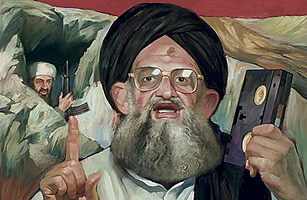
Ayman al-Zawahiri, a cerebral Egyptian surgeon who joined his first jihadist cell at age 15, is as much the force behind al-Qaeda as his more famous friend Osama bin Laden. When the two first met in Pakistan in 1986, al-Zawahiri made a powerful impression on the younger, inexperienced Saudi millionaire. Within a couple of years, bin Laden was funding al-Zawahiri's militant group Al Jihad, while Egyptian militants close to al-Zawahiri were helping bin Laden found al-Qaeda. That was the beginning of a powerful symbiotic relationship that continues to this day.
In the past year or so, al-Zawahiri, 54, has increasingly become the public face and voice of al-Qaeda while bin Laden has ceded the spotlight to his deputy. It was al-Zawahiri who wrote a letter to al-Qaeda's leader in Iraq, Abu Mousab al-Zarqawi, gently suggesting that he stop his habit of beheading hostages because it was turning off many Muslims. In recent months al-Zarqawi has stopped the beheadings. Following the 9/11 attacks, bin Laden released more than 15 audio- and videotapes. But recently he has sharply cut back, releasing only two tapes since December 2004, apparently fearing the U.S. could locate him by tracing back a tape's chain of custody. Meanwhile, al-Zawahiri has released seven tapes. His high profile may account for the Jan. 13 U.S. missile strike on the Afghanistan-Pakistan border aimed at killing him. The attack killed four al-Qaeda members but not al-Zawahiri, who appeared on videotape two weeks later, taunting President Bush and defiantly proclaiming himself alive.
Bergen is the author of The Osama bin Laden I Know: An Oral History of al Qaeda's Leader